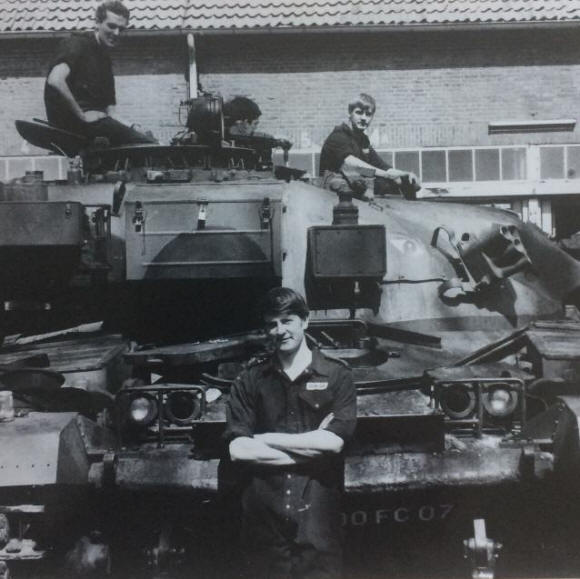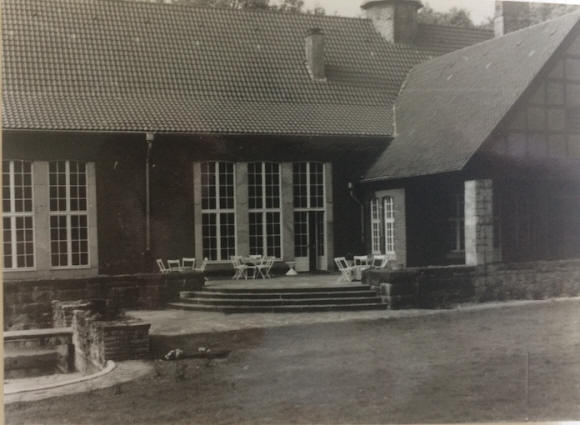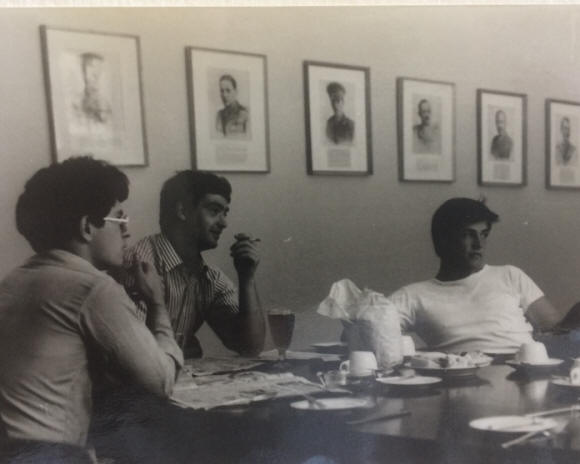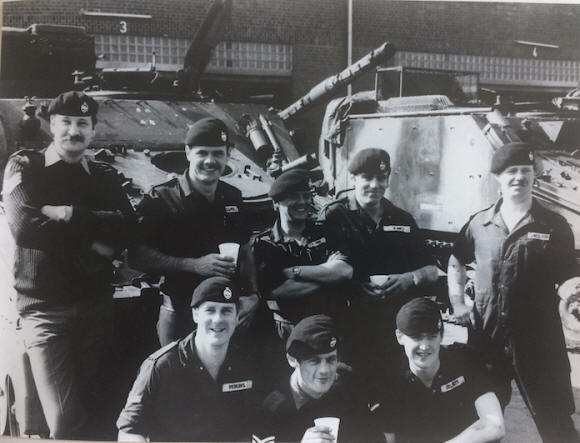|

WHAT
FOLLOWS BELOW is an attempt to describe what it was like
being a young-ish, single, junior officer in a
Germany-based Scottish armoured regiment in the 1980s. I
hardly know where to begin to be honest, there is so
much to cover. I have also had to be cautious with the
detail in some of the anecdotes; many of the better ones
could possibly lead to separations, divorces, or indeed
defamation actions in the courts, so I have omitted some
of the very best stories – for now, anyway.
Perhaps the best place to start is with a brief
description of 4 RTR’s barracks at the time of my
joining, York Kaserne, in Munster. Briefly, they dated
back to the 1930s and had, we were led to believe, been
occupied by a Luftwaffe flak battalion during the Second
World War. There was no sign of their previous
occupation, no statues, regalia, swastikas or the like,
but the buildings were recognisably Teutonic, solid,
brick built and with extensive cellars. The base was
arranged around a parade square with a rectangular road
round it, on either side of which were the buildings
occupied by our personnel and vehicles.

Officer Mess, Munster 1981
Of
particular relevance to my account here were two
buildings which were sited in one corner of the set up
near the main gate, namely the Officers’ Mess (pictured
above) and the Officers’ Mess Annexe, separated by a
single tennis court and some garden. The Mess building
held the dining room, anterooms, bar, a couple (I think)
of bedrooms upstairs for senior single officers, and a
cellar wherein the billiard table lurked. Together with
terrace, garden with ornamental pond, and pleasant
entrance hall it was in pretty good order.
In contrast, the Mess Annexe was a shambles, a chaotic
jumble of subalterns’ rooms on two floors, assorted bits
of cars and motorbikes, and the occasional girlfriend
threading her way along the corridors through the broken
beer bottles. This is where all the real action took
place, of which more later. Very occasionally an overly
zealous CO would announce his attention to inspect, and
there would be a flurry of activity as said motorbikes,
car parts, girlfriends and broken bottles were removed,
but for most of the time it was reminiscent of a
battlefield. Nowadays the environmental health police
would close it down.
Everyday life for a junior officer at that time
consisted of about 20 per cent “work”, 70 per cent
idleness, and 10 per cent hedonistic mayhem, proportions
which could shift significantly from time to time,
usually to the benefit of the mayhem. A normal working
day would start with breakfast in the Mess, individually
cooked to order and brought to table by the Mess waiter
(pictured below - notice the beer), followed by first
parade at 8 am, when you met up with your troop on the
tank park and discussed the day’s business. The tank
park was the preserve of your Troop Sergeant, and he
didn’t want any young officer hanging around for too
long distracting the boys from their work, so we usually
took the hint and disappeared after about 10 minutes or
so.*

Breakfast in Munster 1981
Next came
coffee break at 10 am, held in the officers’ coffee room
in the RHQ block. Many young officers avoided this
altogether, for it was a perfect opportunity for you to
be “bubbled” (ie nominated for some unwelcome task) by
the Adjutant who would seek out the unsuspecting there.
Thereafter there were two long hours to fill before
lunch, again held in the Mess and at which it was not
unheard of to consume four or five beers in preparation
for the rigours of the afternoon. Perhaps
unsurprisingly, there was much sneaking back to your
room for a nap before afternoon tea was served at 4.30
pm or thereabouts, at which more beers might be consumed
as well as tea and toast. There then followed another
long three hours before dinner, a formal event for which
we dressed in suits during the week and jackets and ties
at the weekend. In exceptionally hot weather we might
adopt “Planter’s Order”, in which jackets were dispensed
with but shirt sleeves remained firmly rolled down and
ties were properly worn.
Dinner could be great fun or tedious, depending mainly
on the personality of the senior officer present, who
presided. If he was a good guy it was great fun, if he
was a bore or a bully, or sometimes both, it wasn’t such
good fun. In either case, Herculean amounts of alcohol
were consumed. Then we went to bed, eventually, and
repeated the whole process the next day. With the
benefit of hindsight I think we were all teetering on
the edge of alcoholism, but we were young and foolish
and it was all one big laugh.

Command Troop, Munster 1981
As you
may have surmised, there were huge amounts of downtime,
and those hours were filled by a variety of pursuits.
Some played lots of sport, tennis, rugby and squash
mainly. 4 RTR had a historical tradition with
motorbikes, and there were always two or three parked
outside, and oftentimes inside, the Annex in varying
states of repair and reassembly. We weren’t hugely into
cars except when torching them (see next episode). The
more intellectually minded officers (always viewed with
a bit of suspicion) wrote and painted, and some played
musical instruments. I had my guitar, which some saw as
decidedly dodgy and a sure sign that the Regiment was
going to the dogs.
There was also much going downtown to the various bars
and tearooms that Munster had to offer. The Germans do
kaffee und kuchen extremely well, right up there with
their skills at building cars and invading neighbouring
countries. As there was a big student population, we
also thought that it might give us an opportunity to
chat up the pretty female students we saw everywhere,
but the military was not popular amongst them and most
attempts crashed and burned before we even got to the
flak and searchlights, if you know what I mean. Wie
schade!
Occasionally you would be Orderly Officer for the day,
or sometimes for the week, fortnight, or even month if
you had transgressed excessively. It was hardly an
onerous duty, but necessitated being in uniform all day
– service dress up until 6 pm then patrol blues
thereafter – and carrying out various duties at the
behest of the Adjutant. Armouries were inspected and
weapons counted, soldiers under sentence (ie in the
guardroom for some misdemeanour) were visited (“No
requests or complaints, Sir!”) and food sampled at the
boys’ mealtimes in the cookhouse. Breakfast was a
particular favourite of mine as it allowed me to sample
the sausages on offer; we didn’t get them in the Mess as
they were deemed “not officer food”. Finally, and as
previously noted, you would mount the guard at the
guardroom at 6 pm and visit them during the wee small
hours, the timing of which was decided by the roll of a
dice (die?) on the Adjutant’s desk when you reported for
duty that morning.
And that just about sums up the 20 per cent work and 70
per cent idleness that was the lot of a young officer in
barracks. In the next part I shall endeavour to do
justice to the remaining 10 per cent of hedonistic
madness, which was the best part of all.
To come in Part 5, strong drink, military grade
pyrotechnics, and high jinks; life as a young(ish)
subaltern in the Officers’ Mess. |

